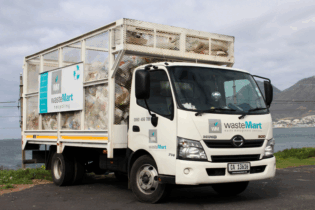 In what is a major development for the South African paper and packaging recycling market, Mpact Recycling has announced that liquid cartons are now recyclable.
In what is a major development for the South African paper and packaging recycling market, Mpact Recycling has announced that liquid cartons are now recyclable.
The packaging giant recently invested R46-million in a Liquid Packaging recycling plant at Mpact’s Springs Paper Mill facility. This development will allow consumers to put their used juice and milk cartons in their Ronnie bags for kerbside collection.
Where there is no kerbside collection, they can deposit their recyclable items in their nearest Ronnie bank or, alternatively, cartons can be delivered to any of Mpact’s buy-back centres countrywide or to one of its seven Mpact Recycling operations for payment.
John Hunt, managing director of Mpact Recycling, says liquid carton packaging provides a category of waste that can be recycled and will add considerably to land preservation in South Africa as consumers can redirect cartons away from limited landfill space.
Then…
Hunt explains that it was previously not possible to recycle juice and milk cartons, poly-coated cups and wet-strength bags, as they are not made of typical paperboard.
“Although approximately 75% of liquid packaging content is paper to make it liquid-proof, the product is lined with low density polyethylene (plastic,) which acts as a water-tight barrier; a lining of aluminium foil which serves as a barrier to light, flavour, and oxygen, enabling the contents to last for months without preservatives or refrigeration; and a coating with kaolin clay to improve the printing surface,” he says.
The mix of plastic and metal (polyalu) meant that cartons could not previously be recycled as the polyalu couldn’t be separated from the paper of the carton.
“These need to be removed before the paper can be recycled,” says Hunt.
And now…
“This was facilitated by two developments. Firstly, local liquid carton manufacturers have over the years redesigned their processes to significantly reduce the amount of plastic used in the packaging.
“Secondly, Mpact’s new Liquid Packaging recycling plant has the capacity to recycle 25 000 tonnes of used liquid cartons per annum and will allow us to produce approximately 18 000 tonnes of recovered fibre, which will be fed directly into our paper division for use in new paper products.”
The investment forms part of Mpact Group’s various recycling initiatives to increase available materials for all its mills.
“This new carton waste recycling facility by Mpact is an opportunity for consumers to change their behaviour towards recycling,” says Rodney Reynders, Cluster Leader, Environment, Greater Middle East and Africa, Tetra Pak.
 In what is a major development for the South African paper and packaging recycling market, Mpact Recycling has announced that liquid cartons are now recyclable.
In what is a major development for the South African paper and packaging recycling market, Mpact Recycling has announced that liquid cartons are now recyclable.





